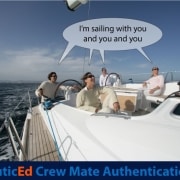How to be a good skipper or crew member on a sailing vacation
This article was specifically written by Grant Headifen, Director of Education for NauticEd for Yacht charter skippers and crewmembers who are going on a sailing vacation. Grant has lead dozens (and dozens) of sailing trips all over the world. He’s seen the good, the bad, and the ugly.
This article is linked to from the Bareboat Charter Skipper Course and the Yacht Charter Crew course. It is designed so that you the crew member or you the skipper can achieve a positive desired outcome on a sailing holiday with friends and relatives.
 Foreword by Grant Headifen: Hi, and thanks for reading this article. It is going to make your trip a whole lot more fun and comfortable. When I first started taking friends on sailing holidays years (and years) ago, I really didn’t have any of the following information. I think I mostly got lucky but I can definitely remember some basic leadership mistakes I made and to think about them is pretty embarrassing. Most of them came from this notion of “I’m the Captain”. But when you really boil it down, your friends are your friends because of who you are already, the type of person you are already without being “The Captain”. Your friends will follow you anyway because of the knowledge about boats that you have. So just drop the self “Captain” authority title if that’s you and get on with having a good time on your trip with your mates. If you’re crew on a boat, realize that you’re there because you got invited. At least one of the crew thought you were the type of person who was cool enough to hang with for a week. Just be that “cool enough” person. Enjoy and contribute!
Foreword by Grant Headifen: Hi, and thanks for reading this article. It is going to make your trip a whole lot more fun and comfortable. When I first started taking friends on sailing holidays years (and years) ago, I really didn’t have any of the following information. I think I mostly got lucky but I can definitely remember some basic leadership mistakes I made and to think about them is pretty embarrassing. Most of them came from this notion of “I’m the Captain”. But when you really boil it down, your friends are your friends because of who you are already, the type of person you are already without being “The Captain”. Your friends will follow you anyway because of the knowledge about boats that you have. So just drop the self “Captain” authority title if that’s you and get on with having a good time on your trip with your mates. If you’re crew on a boat, realize that you’re there because you got invited. At least one of the crew thought you were the type of person who was cool enough to hang with for a week. Just be that “cool enough” person. Enjoy and contribute!
The Reason Everyone is There
On a recreation sailing holiday boat, people are there for one reason only; to enjoy themselves. More than likely, you are there with friends, spouses, family, and friends of family and friends and hopefully – friends to be. Space is confined and the trip is more than just a few hours. Given that, we can’t have any Captain Blighs and we can’t have any mutinous crews either. The boat needs to run smooth and everyone at the end of the trip should leave saying that they would do that again with exactly the same crew. And you, as a member of that crew are 100% responsible for making that happen. Not 10%, not 25%, not 50% but 100%. You have to do everything possible to make that happen. Below, we are going to teach you some skills to make having a good time a reality.
How to Run a Boat
Running a boat requires managers, leaders, and lead-followers.
Managers make things happen. They organize the holiday, they plan the route, they organize the food, they keep a watch on the weather, they make sure the boat and the crew are safe, they manage the fridge, the energy, and supplies like water and fuel. Just like in a company, on a boat there can be multiple managers.
Leaders create an environment whereby others follow their actions. For example, during an anchoring procedure, a leader will take action to direct others to facilitate the desired end state – anchor on the bottom hooked in properly with the boat safely stable. During a sailing procedure like raising the sails, a leader will enlist others to help get the sails up – pulling a halyard line, steer the boat into wind, keep a watch out, grind a winch, and ease the reefing lines.
Lead-followers is a new term probably to most. A lead-follower is a person who simply sometimes leads and sometimes follow. Rarely is anyone always just a follower – no matter how small a task, somewhere along the line they are going to lead someone to do a task. That person is a lead-follower. When following a lead-follower follows the requests of a leader to do the right actions to effect a desired outcome. Followers are sometimes a pure follower. They pull a line when asked. But a follower might then immediately switch roles and become a leader – ‘Hey John. Can you tie the other end of this line off on that cleat please”?
What is interesting is that a good “Leader” teaches followers to lead. This is especially important on a boat. There are a lot of jobs to do and so the crew must be knowledgeable to lead certain situations. Even if it is to ask someone to chop the carrots – that person is now a leader.
So, here are some questions:
- Could a crew member be the manager of the galley, or manage the navigation, or organize the stops for the best snorkelling spots?
- Could the skipper be working the windlass while a crewmember on the helm tells the skipper to release out more anchor chain?
- Could a crew member lead several others to tie the fenders and arrange the docklines?
- Could a crew member ask the skipper to chop the carrots?
Obviously, the answers are yes. Where then in that arrangement is the traditional military style stereotypical Captain? Fact is, that on a recreational boat there is no room for a captain that commands everything with the threat of keelhauling anyone. And there is no room either for a wannabe captain/know-it-all who tries to steal or undermine the captain’s job. YOU ARE ALL THERE ON EACH OTHER’S HOLIDAY EXPERIENCE. Everyone has paid a lot of money to voluntarily be there. No matter who you are or what role on the boat you play, you have a responsibility to the others to ensure that THEY have a good time. If “THEY” are having a good time, chances are you are having a good time.
“Well what about the safety of the crew?” the Captain Bligh type skipper argues. “surely someone has to take responsibility during a potential hazard”. You’re right. But there are good leaders in a safety situation and bad leaders.
- A bad leader yells at crew members (who are btw their friends and family)
- A bad leader brings the stress of their job with them on the boat.
- A bad leader needs to lead all the time.
- A bad leader takes over when someone else is leading
- A bad leader throws a tantrum (as an adult)
- A bad leader stops listening
- A bad leader tries to undermine others
- A bad leader talks behind other’s backs
- A bad leader tries to make themselves look good by making others look bad or less than good
- A bad leader can’t stand to be a follower at times
- A bad leader stops others from engaging in leadership activities
- A bad leader does everything him/herself
- A bad leader is just a plane out ol’ bad leader
Are you a good leader or a bad leader?
“I had to yell to get the attention of everyone” the bad leader says. We can prove that the bad leader didn’t need to yell. There are many skippers on boats out there that can control the boat through a hazard situation without yelling. Did you know that the effect of being yelled at actually causes a flight chemical to release in our brains. This changes the ability of someone to effectively act. When the bad leader yells, they are reducing the effectiveness of their crew. Do you think the bad leader gained any respect by yelling? Nope! The bad leader just went down another rung on the respect ladder. They lost control of themselves, they panicked and yelled because they could not handle the situation.
On the other side, crew members listen up, sometimes things need to get done on the boat and sometimes they need to happen now. “Move the fenders to the other side of the boat”. “Make fast this line”. “Ease the spinnaker guy now”. “Douse the main halyard now”. Turn the boat to windward now”. “Bear away now”. “Man overboard – you Jane, stop talking and point to john in the water and keep your eyes on him no matter what happens on the boat”. These and more are potentially some things you could hear and it’s up to you to get that job done and not take anything personally. You can’t be thinking “who is he to tell me to stop talking”. The job is important and the job is the job for a reason. Are you a good follower when needed or a bad follower?
A Safe Environment to Communicate
What we are going to do here in this article also is to create an environment whereby two people can feel comfortable and safe with a one on one talk with each other quickly after an event. When things flare up, which they will do, from reading this article you both can sit together and speak your feelings and say things like “I did not like it when you said …” or “I’d like to ask that you involve me a little more instead of always jumping in to my rescue, I’m here to learn as well. Would that be ok”?
How do I do It
A wise person (Jim Cathcart) once told me this. He said to always ask myself “How would the person that I want to be, do the thing I am about to do”. In this case, always ask yourself “How would a good leader, lead this situation”?
Let’s go back to the previously defined roles of manager, leader, and lead-follower because that allows us all to relax a little. The skipper of the boat is more like a manager of the boat operations while the boat is moving. That skipper does not need to be on the helm, in fact the skipper is doing them self a disservice of being a good manager by running the helm. There is no way a skipper can be a good boat manager if they spend the day on the helm. The skipper needs to ensure the navigation is correct, attend to seasick crew, ensure everyone is properly hydrated with sunscreen applied, ensure the seacock for the heads are managed properly, check incoming weather, and importantly – ensure everyone is having a good time by organizing games, knot tying competitions, serving food and drinks. The skipper can also be training leaders – leaders to lead the fender tying operations, teaching crew about sail trim so that they can lead the sail trim operations, training leaders to lead the docking lines when coming into a dock. The skipper manages the boat operations.
So all in the name of everyone wanting to come back again next year with the same crew, Ask these questions:
- What would a perfect skipper act like?
- What would a perfect crewmember act like?
And now ask yourself: “How would the skipper or crewmember I want to be, do the skippering or crewmembering that I am about to do”? On a happy boat, more often than not, you will find both the crewmembers and the skipper switching roles between being a leader and a follower. A good skipper knows this and will on purpose be a follower and will be happy to be following. If a skipper is following then it is a sign that the skipper has taught the crew well. This will also be building the self esteem of the crew. So crew, take notice, if the skipper is following you then you are doing a good job of leading – probably because you learned about how to do something well and the skipper trusts you.
Managers and Leaders
What is interesting to note and to distinguish is that when we think about a corporate set up, a manager is in their management job by definition and authority. For example, a sales manager, a marketing manager, or a finance manager are all in their jobs by the authority given to them. Managers make things happen so that their subordinates can get their job done effectively. Managers organize the technology and they look after the needs of the staff. When you think about a boating situation, it is really very similar. Typically, the manager of the boat is the skipper and the skipper is there in their skipper role by the authority of those that agreed to that person being the skipper. But a leader role even in a corporate setup is not by authority. A leader role is earned out of respect from others. Others respect a person for their knowledge, and they respect a person for their ability to create action among others to achieve a desired end state. Thus, a leadership role is earned. And must be constantly earned. If you are the skipper (manager of the boat operations) and also the leader but begin to make poor decisions such as not operating the boat for the enjoyment of the others, you will soon lose respect and you will see your crew team fall apart. And while your leadership role and skipper role might not be toppled in a one-week trip from hell, you sure as heck will not be leading that crew again on a trip.
Similarly, for crew members, you are on this trip because others invited you and they respect you. If you are making poor decisions throughout the week that lead to the lesser enjoyment of others on the boat, the respect you previously earned to get you invited this time will get you uninvited next time. Crewmembers are lead followers and if you are not making constant micro-efforts to lead a good environment on the boat you’re going to be voted off this floating island.
Expectations
For both skippers and crewmembers, it is a good idea to begin your trip with good communication about expectations. This can be done at a short crew briefing prior to leaving the dock on the first day. The skipper has a good opportunity to make people feel comfortable that the skipper is going to be a good one. That the skipper is competent and will make the boat operations go smooth and is a good leader. This can most easily be done by NOT making assignments of operational tasks but by gaining buy-in and volunteers from the crew. No one wants to be assigned a task on a holiday. And it is not a sin to announce that the boat will be run fairly informally, even that announcement is an authoritative enough statement to gain confidence in the management style. It is a holiday after all. The skipper should also gain the knowledge respect by giving a full briefing on the boat, certainly pointing out safety hazards, and creating an environment to make people comfortable about asking questions. At this stage, the skipper needs to know that he or she is being judged by a lot of potentially uncomfortable people that he or she does not know. Anxiety is high among the crew.
At the crew briefing, crew members need to communicate their desired level of participation in the activities and tasks. This time is your time to speak up and voice your expectations, where do you really want to go, what do you really want to do? What are you not comfortable with? It is important that you take this opportunity. It is ok to announce “I’m just here to read a good book. I’ll help out when needed but I’m not here to learn how to sail – is that ok?”
That is ok because that person is here on holiday too – their holiday. All of this sets the stage for consistent expectations. The skipper’s reply to that should be something like “Great – yes that is ok and I’ll keep that in mind. Do you mind however that I can rely on you if I really need something done. Otherwise, I’ll let you get on with turning the pages. Would that be ok”?
I will leave you with two anecdotes.
- One time on a sailing holiday in the Bay of Islands New Zealand on my friend’s boat. We were sailing off our anchorage spot in a crowded harbour (because his engine was broken). My friend the skipper and a dang good leader announced to me in a calm voice “Hey Grant, do you see that green boat right there”?
“Yes” I replied
“Well, we are going to hit it. Could you please walk up front and fend us off”
Whereby I did exactly as he asked and we then went on our merry way for the day.
- While sailing in Greece on one of our organized flotillas, the sister in-law of one of the skippers of a flotilla boat said to me on day 3. “I’m so happy to be here and so happy my brother in-law asked me to come. I don’t care what he or anyone on the boat asks me to do – I’m just going to do it. I want to be invited on all of these trips forever.”
Thanks for reading through this special article. I hope you gained some good insights. I invite you now to listen to this podcast that we did with Lt. Col Edward O’Connor, Ex Navy Top Gun Adversary trainer. Ed does a fantastic job of using his background to describe how the defined roles of manager, leader and Lead-follower on a boat make the boat operate smoothly.







